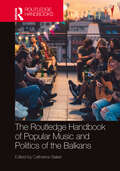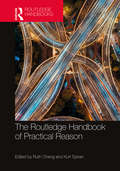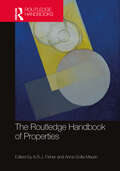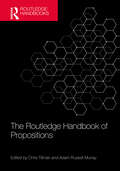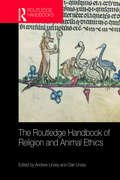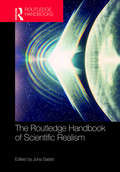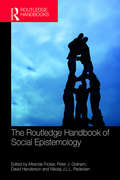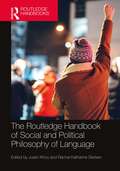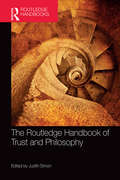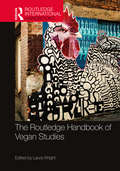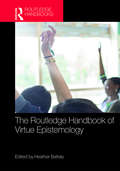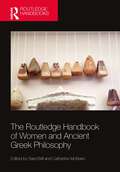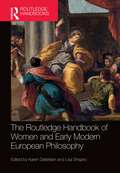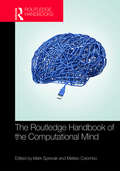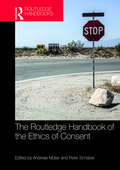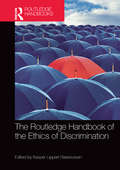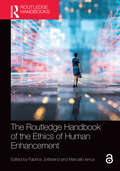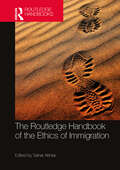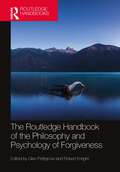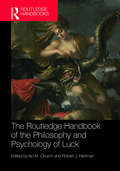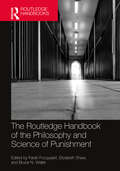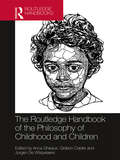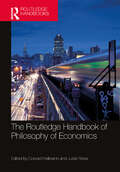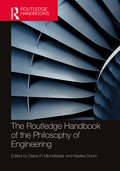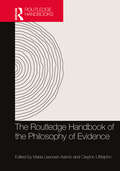- Table View
- List View
The Routledge Handbook of Popular Music and Politics of the Balkans (Routledge Music Handbooks)
by Catherine BakerThe Routledge Handbook of Popular Music and Politics of the Balkans is a comprehensive overview of major topics, established debates and new directions in the study of popular music and politics in this region.The vibrant growth of this subject area since the 1990s has been intertwined with the region’s political and socio-economic transformations, including the collapse of state socialism in much of the region, the break-up of Yugoslavia, the advent of neoliberal capitalism, the rise of Romani activism, the complex politics of ‘Europeanization’ before and after the global financial crisis, and the region’s relationship to the European Union border regime. The handbook illustrates the wide range of disciplines and methods that contribute to this field’s interdisciplinary dialogue and highlights emerging approaches such as the study of Black diasporas in the region, popular music’s links with LGBTQ+ communities, and the impact of digital technologies on musical cultures.This volume will benefit specialist researchers, tutors creating or refreshing courses on popular music in the region, and students interested in these topics, especially those who are at the point of developing their own independent research projects.
The Routledge Handbook of Practical Reason (Routledge Handbooks in Philosophy)
by Ruth Chang Kurt SylvanOver the last several decades, questions about practical reason have come to occupy the center stage in ethics and metaethics. The Routledge Handbook of Practical Reason is an outstanding reference source to this exciting and distinctive subject area and is the first volume of its kind. Comprising thirty-six chapters by an international team of contributors, the Handbook provides a comprehensive overview of the field and is divided into five parts: Foundational Matters Practical Reason in the History of Philosophy Philosophy of Practical Reason as Action Theory and Moral Psychology Philosophy of Practical Reason as Theory of Practical Normativity The Philosophy of Practical Reason as the Theory of Practical Rationality The Handbook also includes two chapters by the late Derek Parfit, ‘Objectivism about Reasons’ and ‘Normative Non-Naturalism.’ The Routledge Handbook of Practical Reason is essential reading for philosophy students and researchers in metaethics, philosophy of action, action theory, ethics, and the history of philosophy.
The Routledge Handbook of Properties (Routledge Handbooks in Philosophy)
by Anna-Sofia Maurin Fisher, A.R.J.Philosophical questions regarding both the existence and nature of properties are ubiquitous in ordinary life, the sciences, and philosophical theorising. In philosophy, it is one of the oldest topics discussed in various intellectual traditions – East and West – reaching back to Plato and Aristotle. Today, in the analytic tradition, properties continue to be a core area of study and research. The Routledge Handbook of Properties is an outstanding reference source to this perennial topic and is the first major volume of its kind. It contains forty specially commissioned chapters written by an international team of expert contributors, and is divided into nine clear parts: Methodology and Metaontology Distinctions Realism about Universals Nominalism Trope Theory Properties in Causation, Time, and Modality Properties in Science Properties in Language and Mind Properties in the Normative Realm, the Social World, and Aesthetics The Routledge Handbook of Properties is essential reading for anyone studying and researching metaphysics, metametaphysics, and ontology, and will also be of interest to those in closely related areas such as philosophy of science, philosophy of language, philosophy of mind, ethics, and aesthetics.
The Routledge Handbook of Propositions (Routledge Handbooks in Philosophy)
by Adam Russell Murray Chris TillmanPropositions are routinely invoked by philosophers, linguists, logicians, and other theorists engaged in the study of meaning, communication, and the mind. To investigate the nature of propositions is to investigate the very nature of our connection to each other, and to the world around us. As one of the only volumes of its kind, The Routledge Handbook of Propositions provides a comprehensive overview of the philosophy of propositions, from both historical and contemporary perspectives. Comprising 33 original chapters by an international team of scholars, the volume addresses both traditional and emerging questions concerning the nature of propositions, and our capacity to engage with them in thought and in communication. The chapters are clearly organized into the following three sections: I. Foundational Issues in the Theory of Propositions II. Historical Theories of Propositions III. Contemporary Theories of Propositions Essential reading for philosophers of language and mind, and for those working in neighboring areas, The Routledge Handbook of Propositions is suitable for upper-level undergraduate study, as well as graduate and professional research.
The Routledge Handbook of Religion and Animal Ethics (Routledge Handbooks in Religion)
by Andrew Linzey Clair LinzeyThe ethical treatment of non-human animals is an increasingly significant issue, directly affecting how people share the planet with other creatures and visualize themselves within the natural world. The Routledge Handbook of Religion and Animal Ethics is a key reference source in this area, looking specifically at the role religion plays in the formation of ethics around these concerns. Featuring thirty-five chapters by a team of international contributors, the handbook is divided into two parts. The first gives an overview of fifteen of the major world religions’ attitudes towards animal ethics and protection. The second features five sections addressing the following topics: Human Interaction with Animals Killing and Exploitation Religious and Secular Law Evil and Theodicy Souls and Afterlife This handbook demonstrates that religious traditions, despite often being anthropocentric, do have much to offer to those seeking a framework for a more enlightened relationship between humans and non-human animals. As such, The Routledge Handbook of Religion and Animal Ethics is essential reading for students and researchers in religious studies, theology, and animal ethics as well as those studying the philosophy of religion and ethics more generally.
The Routledge Handbook of Scientific Realism (Routledge Handbooks in Philosophy)
by Juha SaatsiScientific realism is a central, long-standing, and hotly debated topic in philosophy of science. Debates about scientific realism concern the very nature and extent of scientific knowledge and progress. Scientific realists defend a positive epistemic attitude towards our best theories and models regarding how they represent the world that is unobservable to our naked senses. Various realist theses are under sceptical fire from scientific antirealists, e.g. empiricists and instrumentalists. The different dimensions of the ensuing debate centrally connect to numerous other topics in philosophy of science and beyond. The Routledge Handbook of Scientific Realism is an outstanding reference source – the first collection of its kind – to the key issues, positions, and arguments in this important topic. Its thirty-four chapters, written by a team of international experts, are divided into five parts: Historical development of the realist stance Classic debate: core issues and positions Perspectives on contemporary debates The realism debate in disciplinary context Broader reflections In these sections, the core issues and debates presented, analysed, and set into broader historical and disciplinary contexts. The central issues covered include motivations and arguments for realism; challenges to realism from underdetermination and history of science; different variants of realism; the connection of realism to relativism and perspectivism; and the relationship between realism, metaphysics, and epistemology. The Routledge Handbook of Scientific Realism is essential reading for students and researchers in philosophy of science. It will also be very useful for anyone interested in the nature and extent of scientific knowledge.
The Routledge Handbook of Social Epistemology (Routledge Handbooks in Philosophy)
by David Henderson Miranda Fricker Jeremy Wyatt Peter J. Graham Nikolaj PedersenEdited by an international team of leading scholars, The Routledge Handbook of Social Epistemology is the first major reference work devoted to this growing field. The Handbook’s 46 chapters, all appearing in print here for the first time, and written by philosophers and social theorists from around the world, are organized into eight main parts: Historical Backgrounds The Epistemology of Testimony Disagreement, Diversity, and Relativism Science and Social Epistemology The Epistemology of Groups Feminist Epistemology The Epistemology of Democracy Further Horizons for Social Epistemology With lists of references after each chapter and a comprehensive index, this volume will prove to be the definitive guide to the burgeoning interdisciplinary field of social epistemology.
The Routledge Handbook of Social and Political Philosophy of Language (Routledge Handbooks in Philosophy)
by Justin Khoo Rachel SterkenThis Handbook brings together philosophical work on how language shapes, and is shaped by, social and political factors. Its 24 chapters were written exclusively for this volume by an international team of leading researchers, and together they provide a broad expert introduction to the major issues currently under discussion in this area. The volume is divided into four parts: Part I: Methodological and Foundational IssuesPart II: Non-ideal Semantics and PragmaticsPart III: Linguistic HarmsPart IV: Applications The parts, and chapters in each part, are introduced in the volume’s General Introduction. A list of Works Cited concludes each chapter, pointing readers to further areas of study. The Handbook is the first major, multi-authored reference work in this growing area and essential reading for anyone interested in the nature of language and its relationship to social and political reality.
The Routledge Handbook of Trust and Philosophy (Routledge Handbooks in Philosophy)
by Judith SimonTrust is pervasive in our lives. Both our simplest actions – like buying a coffee, or crossing the street – as well as the functions of large collective institutions – like those of corporations and nation states – would not be possible without it. Yet only in the last several decades has trust started to receive focused attention from philosophers as a specific topic of investigation. The Routledge Handbook of Trust and Philosophy brings together 31 never-before published chapters, accessible for both students and researchers, created to cover the most salient topics in the various theories of trust. The Handbook is broken up into three sections: I. What is Trust? II. Whom to Trust? III. Trust in Knowledge, Science, and Technology The Handbook is preceded by a foreword by Maria Baghramian, an introduction by volume editor Judith Simon, and each chapter includes a bibliography and cross-references to other entries in the volume.
The Routledge Handbook of Vegan Studies (Routledge International Handbooks)
by Laura WrightThis wide-ranging volume explores the tension between the dietary practice of veganism and the manifestation, construction, and representation of a vegan identity in today’s society. Emerging in the early 21st century, vegan studies is distinct from more familiar conceptions of "animal studies," an umbrella term for a three-pronged field that gained prominence in the late 1990s and early 2000s, consisting of critical animal studies, human animal studies, and posthumanism. While veganism is a consideration of these modes of inquiry, it is a decidedly different entity, an ethical delineator that for many scholars marks a complicated boundary between theoretical pursuit and lived experience. The Routledge Handbook of Vegan Studies is the must-have reference for the important topics, problems, and key debates in the subject area and is the first of its kind. Comprising over 30 chapters by a team of international contributors, this handbook is divided into five parts: History of vegan studies Vegan studies in the disciplines Theoretical intersections Contemporary media entanglements Veganism around the world These sections contextualize veganism beyond its status as a dietary choice, situating veganism within broader social, ethical, legal, theoretical, and artistic discourses. This book will be essential reading for students and researchers of vegan studies, animal studies, and environmental ethics.
The Routledge Handbook of Virtue Epistemology (Routledge Handbooks in Philosophy)
by Heather BattalyWhat is an epistemic virtue? Are epistemic virtues reliable? Are they motivated by a love of truth? Do epistemic virtues produce knowledge and understanding? How can we develop epistemic virtues? The Routledge Handbook of Virtue Epistemology answers all of these questions. This landmark volume provides a pluralistic and comprehensive picture of the field of virtue epistemology. It is the first large-scale volume of its kind on the topic. Composed of 41 chapters, all published here for the first time, it breaks new ground in four areas. It articulates the structure and features of epistemic virtues. It provides in-depth analyses of 10 individual epistemic virtues. It examines the connections between epistemic virtue, knowledge, and understanding. It applies virtue epistemology, and explores its impact on related fields. The contributing authors are pioneers in the study of epistemic virtue. This volume is an outstanding resource for students and scholars in philosophy, as well as researchers in intersecting fields, including education, psychology, political science, and women’s studies.
The Routledge Handbook of Women and Ancient Greek Philosophy (Routledge Handbooks in Philosophy)
by Sara Brill Catherine McKeenThe Routledge Handbook of Women and Ancient Greek Philosophy is an essential reference source for cutting-edge scholarship on women, gender, and philosophy in Greek antiquity. The volume features original research that crosses disciplines, offering readers an accessible guide to new methods, new sources, and new questions in the study of ancient Greek philosophy and its multiple afterlives. Comprising 40 chapters from a diverse international group of experts, the Handbook considers questions about women and gender in sources from Greek antiquity spanning the period from 7th c. BCE to 2nd c. BCE, and in receptions of Greek antiquity from the Roman Imperial period, through the European Renaissance to the current day. Chapters are organized into five major sections: I. Early Greek antiquity – including Sappho, Presocratic philosophy, Sophists, and Greek tragedy – 700s–400s BCEII. Classical Greek antiquity – including Aeschines, Plato, and Xenophon – 400s–300s BCEIII. Late Classical Greek to Hellenistic antiquity – including Cyrenaics, Cynics, the Hippocratic corpus, and Aristotle – 300s–200s BCEIV. Late Greek antiquity to Roman Imperial period – including Pythagorean women, Stoics, Pyrrhonian Skeptics, and late Platonists – 200s BCE to 700s CEV. Later receptions – including Shakespeare, the European Renaissance, Anna Julia Cooper, W.E.B. DuBois, Jane Harrison, Sarah Kofman, and Toni MorrisonThe Routledge Handbook of Women and Ancient Greek Philosophy is a vital resource for students and scholars in philosophy, Classics, and gender studies who want to gain a deeper understanding of philosophy’s rich past and explore sources and questions beyond the traditional canon. The volume is a valuable resource, as well, for students and scholars from history, humanities, literature, political science, religious studies, rhetorical studies, theatre, and LGBTQ and sexuality studies.
The Routledge Handbook of Women and Early Modern European Philosophy (Routledge Handbooks in Philosophy)
by Karen Detlefsen Lisa ShapiroThe Routledge Handbook of Women and Early Modern European Philosophy is an outstanding reference source for the wide range of philosophical contributions made by women writing in Europe from about 1560 to 1780. It shows the range of genres and methods used by women writing in these centuries in Europe, thus encouraging an expanded understanding of our historical canon. Comprising 46 chapters by a team of contributors from all over the globe, including early career researchers, the Handbook is divided into the following sections: I. Context II. Themes A. Metaphysics and Epistemology B. Natural Philosophy C. Moral Philosophy D. Social-Political PhilosophyIII. FiguresIV. State of the Field The volume is essential reading for students and researchers in philosophy who are interested in expanding their understanding of the richness of our philosophical past, including in order to offer expanded, more inclusive syllabi for their students. It is also a valuable resource for those in related fields like gender and women’s studies; history; literature; sociology; history and philosophy of science; and political science.
The Routledge Handbook of the Computational Mind (Routledge Handbooks in Philosophy)
by Mark Sprevak Matteo ColomboComputational approaches dominate contemporary cognitive science, promising a unified, scientific explanation of how the mind works. However, computational approaches raise major philosophical and scientific questions. In what sense is the mind computational? How do computational approaches explain perception, learning, and decision making? What kinds of challenges should computational approaches overcome to advance our understanding of mind, brain, and behaviour? The Routledge Handbook of the Computational Mind is an outstanding overview and exploration of these issues and the first philosophical collection of its kind. Comprising thirty-five chapters by an international team of contributors from different disciplines, the Handbook is organised into four parts: History and future prospects of computational approaches Types of computational approach Foundations and challenges of computational approaches Applications to specific parts of psychology. Essential reading for students and researchers in philosophy of mind, philosophy of psychology, and philosophy of science, The Routledge Handbook of the Computational Mind will also be of interest to those studying computational models in related subjects such as psychology, neuroscience, and computer science.
The Routledge Handbook of the Ethics of Consent (Routledge Handbooks in Applied Ethics)
by Andreas Müller Peter SchaberWhile the importance of consent has been discussed widely over the last few decades, interest in its study has received renewed attention in recent years, particularly regarding medical treatment, clinical research and sexual acts. The Routledge Handbook of the Ethics of Consent is an outstanding reference source to this exciting subject and the first collection of its kind. Comprising over thirty chapters by a team of international contributors, the Handbook is divided into five main parts: • General questions • Normative ethics • Legal theory • Medical ethics • Political philosophy. Within these sections central issues, debates and problems are examined, including: the nature and normative importance of consent, paternalism, exploitation and coercion, privacy, sexual consent, consent and criminal law, informed consent, organ donation, clinical research, and consent theory of political obligation and authority. The Routledge Handbook of the Ethics of Consent is essential reading for students and researchers in moral theory, applied ethics, medical ethics, philosophy of law and political philosophy. This volume will also be very useful for those in related fields, such as political science, law, medicine and social science.
The Routledge Handbook of the Ethics of Discrimination (Routledge Handbooks in Applied Ethics)
by Kasper Lippert-RasmussenWhile it has many connections to other topics in normative and applied ethics, discrimination is a central subject in philosophy in its own right. It plays a significant role in relation to many real-life complaints about unjust treatment or unjust inequalities, and it raises a number of questions in political and moral philosophy, and in legal theory. Some of these questions include: what distinguishes the concept of discrimination from the concept of differential treatment? What distinguishes direct from indirect discrimination? Is discrimination always morally wrong? What makes discrimination wrong? How should we eliminate the effects of discrimination? By covering a wide range of topics, and by doing so in a way that does not assume prior acquaintance, this handbook enables the reader to get to grips with the omnipresent issue. The Routledge Handbook of the Ethics of Discrimination is an outstanding reference source to this exciting subject and the first collection of its kind. Comprising over thirty chapters by a team of international contributors the handbook is divided into six main parts: • conceptual issues • the wrongness of discrimination • groups of ‘discriminatees’ • sites of discrimination • causes and means • history of discrimination. Essential reading for students and researchers in applied ethics and political philosophy the handbook will also be very useful for those in related fields, such as law, sociology and politics.
The Routledge Handbook of the Ethics of Human Enhancement (Routledge Handbooks in Applied Ethics)
by Fabrice Jotterand and Marcello IencaThe Routledge Handbook of the Ethics of Human Enhancement provides readers with a philosophically rich and scientifically grounded analysis of human enhancement and its ethical implications. A landmark in the academic literature, the volume covers human enhancement in genetic engineering, neuroscience, synthetic biology, regenerative medicine, bioengineering, and many other fields. The Handbook includes a diverse and multifaceted collection of 30 chapters—all appearing here in print for the first time— that reveal the fundamental ethical challenges related to human enhancement. The chapters have been written by internationally recognized leaders in the field and are organized into seven parts: Historical Background and Key Concepts Human Enhancement and Human Nature Physical Enhancement Cognitive Enhancement Mood Enhancement and Moral Enhancement Human Enhancement and Medicine Legal, Social, and Political Implications The depth and topical range of the Handbook makes it an essential resource for upper-level undergraduates, graduate students, and postdoctoral fellows in a broad variety of disciplinary areas. Furthermore, it is an authoritative reference for basic scientists, philosophers, engineers, physicians, lawyers, and other professionals who work on the topic of human enhancement.
The Routledge Handbook of the Ethics of Immigration (Routledge Handbooks in Applied Ethics)
by Sahar AkhtarImmigration poses some of the major moral, economic, and political challenges of the twenty-first century. Questions of the state’s responsibilities toward immigrants, open borders, security, coping with the displacement of people caused by climate change and natural disasters, and deciding who has a ‘right to remain’ are but some of the significant issues currently faced by governments, policymakers, and humanitarian organizations.The Routledge Handbook of the Ethics of Immigration is an outstanding reference source to this vitally important topic. Comprising twenty-five chapters by an international team of philosophers, economists, political scientists, and legal theorists, the handbook is organized into seven clear parts: Open Borders or Right to Control: Theoretical Arguments Open Borders or Right to Control: Practical Approaches Culture, Language, and Institutions Immigration and Discrimination Entry, Exit, and Exploitation Climate, Refugees, and Protection Immigration Enforcement In these sections a range of important issues are explored, such as immigration and cultural diversity, the economic aspects of immigration, discrimination, exploitation, definitions of refugee status, territory, citizenship, trafficking and gender. As such, The Routledge Handbook of the Ethics of Immigration will be of great interest to those studying philosophy, politics, economics, and related subjects such as law, sociology, and social policy.
The Routledge Handbook of the Philosophy and Psychology of Forgiveness (Routledge Handbooks in Philosophy)
by Robert Enright Glen PettigroveThe Routledge Handbook of the Philosophy and Psychology of Forgiveness brings into conversation research from multiple disciplines, offering readers a comprehensive guide to current forgiveness research. Its 42 chapters, newly commissioned from an internationally acclaimed group of scholars, are divided into five parts: Religious Traditions Historic Treatments The Nature of Forgiveness Normative Issues Empirical Findings While the principal aim of the handbook is to provide a guide to the philosophical literature on forgiveness that, ideally, will inform the psychological sciences in developing more philosophically accurate measures and psychological treatments of forgiveness, the volume will be of interest to students and researchers with a wide range of disciplinary backgrounds, including philosophy, psychology, theology, religious studies, classics, history, politics, law, and education.
The Routledge Handbook of the Philosophy and Psychology of Luck (Routledge Handbooks in Philosophy)
by Ian M. Church Robert J. HartmanLuck permeates our lives, and this raises a number of pressing questions: What is luck? When we attribute luck to people, circumstances, or events, what are we attributing? Do we have any obligations to mitigate the harms done to people who are less fortunate? And to what extent is deserving praise or blame affected by good or bad luck? Although acquiring a true belief by an uneducated guess involves a kind of luck that precludes knowledge, does all luck undermine knowledge? The academic literature has seen growing, interdisciplinary interest in luck, and this volume brings together and explains the most important areas of this research. It consists of 39 newly commissioned chapters, written by an internationally acclaimed team of philosophers and psychologists, for a readership of students and researchers. Its coverage is divided into six sections: I: The History of Luck II: The Nature of Luck III: Moral Luck IV: Epistemic Luck V: The Psychology of Luck VI: Future Research. The chapters cover a wide range of topics, from the problem of moral luck, to anti-luck epistemology, to the relationship between luck attributions and cognitive biases, to meta-questions regarding the nature of luck itself, to a range of other theoretical and empirical questions. By bringing this research together, the Handbook serves as both a touchstone for understanding the relevant issues and a first port of call for future research on luck.
The Routledge Handbook of the Philosophy and Science of Punishment (Routledge Handbooks in Philosophy)
by Farah FocquaertPhilosophers, legal scholars, criminologists, psychiatrists, and psychologists have long asked important questions about punishment: What is its purpose? What theories help us better understand its nature? Is punishment just? Are there effective alternatives to punishment? How can empirical data from the sciences help us better understand punishment? What are the relationships between punishment and our biology, psychology, and social environment? How is punishment understood and administered differently in different societies? The Routledge Handbook of the Philosophy and Science of Punishment is the first major reference work to address these and other important questions in detail, offering 31 chapters from an international and interdisciplinary team of experts in a single, comprehensive volume. It covers the major theoretical approaches to punishment and its alternatives; emerging research from biology, psychology, and social neuroscience; and important special issues like the side-effects of punishment and solitary confinement, racism and stigmatization, the risk and protective factors for antisocial behavior, and victims' rights and needs. The Handbook is conveniently organized into four sections: I. Theories of Punishment and Contemporary Perspectives II. Philosophical Perspectives on Punishment III. Sciences, Prevention, and Punishment IV. Alternatives to Current Punishment Practices A volume introduction and a comprehensive index help make The Routledge Handbook of the Philosophy and Science of Punishment essential reading for upper-undergraduate and postgraduate students in disciplines such as philosophy, law, criminology, psychology, and forensic psychiatry, and highly relevant to a variety of other disciplines such as political and social sciences, behavioral and neurosciences, and global ethics. It is also an ideal resource for anyone interested in current theories, research, and programs dealing with the problem of punishment.
The Routledge Handbook of the Philosophy of Childhood and Children (Routledge Handbooks in Philosophy)
by Gideon Calder Anca Gheaus Jurgen De WispelaereChildhood looms large in our understanding of human life, as a phase through which all adults have passed. Childhood is foundational to the development of selfhood, the formation of interests, values and skills and to the lifespan as a whole. Understanding what it is like to be a child, and what differences childhood makes, are thus essential for any broader understanding of the human condition. The Routledge Handbook of the Philosophy of Childhood and Children is an outstanding reference source for the key topics, problems and debates in this crucial and exciting field and is the first collection of its kind. Comprising over thirty chapters by a team of international contributors the Handbook is divided into five parts: · Being a child · Childhood and moral status · Parents and children · Children in society · Children and the state. Questions covered include: What is a child? Is childhood a uniquely valuable state, and if so why? Can we generalize about the goods of childhood? What rights do children have, and are they different from adults’ rights? What (if anything) gives people a right to parent? What role, if any, ought biology to play in determining who has the right to parent a particular child? What kind of rights can parents legitimately exercise over their children? What roles do relationships with siblings and friends play in the shaping of childhoods? How should we think about sexuality and disability in childhood, and about racialised children? How should society manage the education of children? How are children’s lives affected by being taken into social care? The Routledge Handbook of the Philosophy of Childhood and Children is essential reading for students and researchers in philosophy of childhood, political philosophy and ethics as well as those in related disciplines such as education, psychology, sociology, social policy, law, social work, youth work, neuroscience and anthropology.
The Routledge Handbook of the Philosophy of Economics (Routledge Handbooks in Philosophy)
by Julian Reiss Conrad HeilmannThe most fundamental questions of economics are often philosophical in nature, and philosophers have, since the very beginning of Western philosophy, asked many questions that current observers would identify as economic. The Routledge Handbook of Philosophy of Economics is an outstanding reference source for the key topics, problems, and debates at the intersection of philosophical and economic inquiry. It captures this field of countless exciting interconnections, affinities, and opportunities for cross-fertilization. Comprising 35 chapters by a diverse team of contributors from all over the globe, the Handbook is divided into eight sections: I. RationalityII. Cooperation and InteractionIII. MethodologyIV. ValuesV. Causality and ExplanationVI. Experimentation and SimulationVII. EvidenceVIII. Policy The volume is essential reading for students and researchers in economics and philosophy who are interested in exploring the interconnections between the two disciplines. It is also a valuable resource for those in related fields like political science, sociology, and the humanities.
The Routledge Handbook of the Philosophy of Engineering (Routledge Handbooks in Philosophy)
by Diane P. Michelfelder; Neelke DoornEngineering has always been a part of human life but has only recently become the subject matter of systematic philosophical inquiry. The Routledge Handbook of the Philosophy of Engineering presents the state-of-the-art of this field and lays a foundation for shaping future conversations within it. With a broad scholarly scope and 55 chapters contributed by both established experts and fresh voices in the field, the Handbook provides valuable insights into this dynamic and fast-growing field. The volume focuses on central issues and debates, established themes, and new developments in: Foundational perspectives Engineering reasoning Ontology Engineering design processes Engineering activities and methods Values in engineering Responsibilities in engineering practice Reimagining engineering The Routledge Handbook of the Philosophy of Engineering will be of value for both students and active researchers in philosophy of engineering and in cognate fields (philosophy of technology, philosophy of design). It is also intended for engineers working both inside and outside of academia who would like to gain a more fundamental understanding of their particular professional field. The increasing development of new technologies, such as autonomous vehicles, and new interdisciplinary fields, such as human-computer interaction, calls not only for philosophical inquiry but also for engineers and philosophers to work in collaboration with one another. At the same time, the demands on engineers to respond to the challenges of world health, climate change, poverty, and other so-called "wicked problems" have also been on the rise. These factors, together with the fact that a host of questions concerning the processes by which technologies are developed have arisen, make the current Handbook a timely and valuable publication.
The Routledge Handbook of the Philosophy of Evidence (Routledge Handbooks in Philosophy)
by Clayton Littlejohn Maria Lasonen-AarnioWhat one can know depends on one’s evidence. Good scientific theories are supported by evidence. Our experiences provide us with evidence. Any sort of inquiry involves the seeking of evidence. It is irrational to believe contrary to your evidence. For these reasons and more, evidence is one of the most fundamental notions in the field of epistemology and is emerging as a crucial topic across academic disciplines. The Routledge Handbook of the Philosophy of Evidence is an outstanding reference source to the key topics, problems, and debates in this exciting subject and is the first major volume of its kind. Comprising forty chapters by an international team of contributors the handbook is divided into six clear parts: The Nature of Evidence Evidence and Probability The Social Epistemology of Evidence Sources of Evidence Evidence and Justification Evidence in the Disciplines The Routledge Handbook of the Philosophy of Evidence is essential reading for students and researchers in philosophy of science and epistemology, and will also be of interest to those in related disciplines across the humanities and social sciences, such as law, religion, and history.
